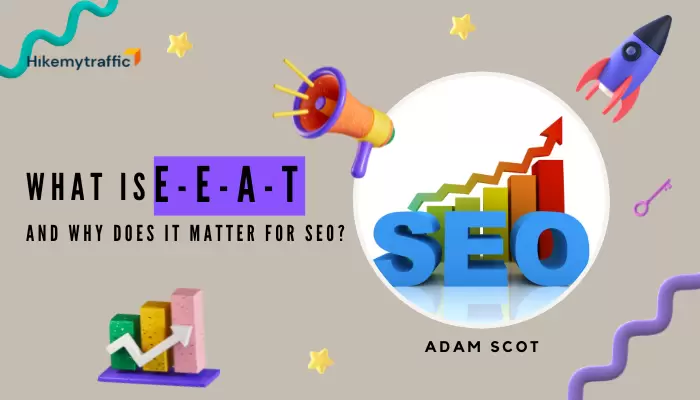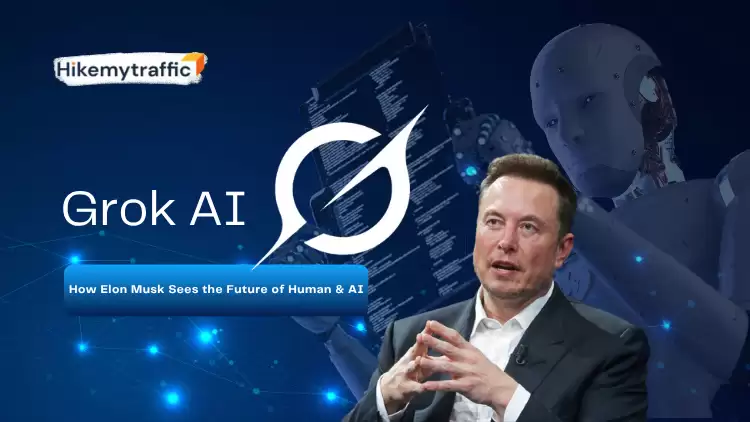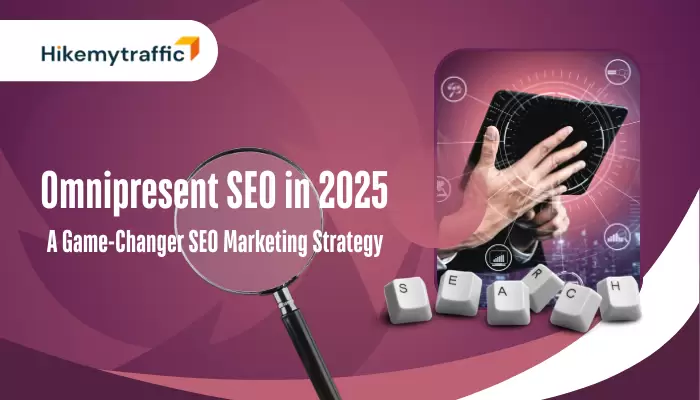What Is E-E-A-T and Why Does It Matter for SEO?
One of the most popular topics in recent years is Google’s E-E-A-T. You might have seen this term pop up in SEO guides, blog posts, or even in Google’s quality rater guidelines. But what exactly is E-E-A-T, and why has it become such an important factor in how Google ranks content?
Understanding E-E-A-T is essential for anyone involved in digital marketing, content creation, or website optimization.
In this blog, we’ll dive deep into what E-E-A-T stands for, how it evolved, why it matters, and how you can optimize your content to align with it.
The Meaning Behind E-E-A-T
E-E-A-T stands for Experience, Expertise, Authoritativeness, and Trustworthiness. Originally introduced as E-A-T in Google’s Search Quality Evaluator Guidelines, the extra “E” for Experience was added in December 2022. Each element of E-E-A-T plays a key role in how Google evaluates content quality.“Experience” refers to whether the content creator has first-hand experience with the subject they are writing about. “Expertise” focuses on the depth of knowledge the content creator has. “Authoritativeness” evaluates how respected and recognized the creator or website is within their industry or field. “Trustworthiness” is about whether the content and the site as a whole can be trusted.
Together, these elements help Google determine whether a piece of content should be ranked higher or lower in search results.
The Evolution of E-E-A-T
Initially, Google’s E-A-T came into the spotlight when it updated its Search Quality Rater Guidelines in 2014. The concept was introduced as part of Google’s efforts to improve the quality of content shown in search results. At the time, the internet was flooded with low-quality or even harmful content, especially in sensitive areas like health, finance, and legal advice.The goal was to find a way to prioritize content that is not only well-written but also credible, helpful, and produced by trustworthy sources. Over time, E-A-T became more than just a guideline for human raters, it turned into a fundamental aspect of how Google’s algorithm assesses content.
Then, in December 2022, Google introduced an update to E-A-T by adding a second “E” for Experience. This was a significant shift. It showed that Google was not just interested in expert advice from professionals but also wanted to reward content that reflects real-world, first-hand experiences.
Understanding Each Element of E-E-A-T
To truly grasp why E-E-A-T matters, let’s break down each of its components in detail.Experience
Experience is all about personal involvement. Has the author done the thing they’re talking about? For example, if someone writes a review of a laptop, have they used that laptop? If they’re writing about traveling to Italy, have they been there?Google now places a lot of value on first-hand experiences because it often leads to more authentic, useful, and relatable content. People trust content more when it comes from someone who has been through the experience themselves. That’s why blog posts, user-generated reviews, and testimonials are becoming increasingly important.
Expertise
Expertise refers to the depth of knowledge or skill someone has in a particular subject. This doesn’t always mean having a formal qualification. In many cases, life experience or deep practical knowledge can be just as valid, especially in areas like cooking, parenting, or personal finance.However, in more technical or sensitive topics, such as medicine or law, Google tends to prioritize content from certified professionals. It’s one thing to read about heart surgery, but another to get advice from a practicing cardiologist.
Authoritativeness
Authoritativeness is about reputation. Is the content creator or the website recognized as a go-to source in its field? Are other respected sites referencing or linking to this website?This is where backlinks, mentions in news outlets, and recognition within your industry matter. If your content is being cited by other experts or published on reputable platforms, it adds to your perceived authority.
Google uses various signals to measure authority, including how often your content is shared, who is linking to you, and even your presence in directories or databases.
Trustworthiness
Trust is the foundation of E-E-A-T. If people don’t trust your website, it doesn’t matter how experienced or knowledgeable you are. Trustworthiness covers everything from having an SSL certificate (HTTPS) to publishing accurate content, disclosing sources, and being transparent about who you are.For e-commerce sites, this also includes having clear return policies, contact information, and secure payment systems. For content sites, it means citing reliable sources, updating outdated information, and making it easy for readers to verify your claims.
Why E-E-A-T Is Crucial for SEO
At this point, you might be wondering: how does E-E-A-T impact SEO directly? While E-E-A-T isn’t a direct ranking factor in the way keywords or backlinks are, it heavily influences how Google evaluates the overall quality of a site.Google’s algorithm is complex, and it looks at thousands of signals to determine which pages should appear in search results. E-E-A-T is part of a broader approach that helps the algorithm reward high-quality, trustworthy content.
When Google’s human quality raters review pages, they use E-E-A-T as a guide. Their feedback helps improve the algorithm over time. So, even though E-E-A-T isn’t a ranking factor by itself, it’s baked into how Google determines which content is valuable and which is not.
In other words, optimizing for E-E-A-T helps future-proof your website. As Google continues to refine its algorithm, it will likely keep moving in the direction of prioritizing high-quality, reliable, and experience-driven content.
E-E-A-T and YMYL (Your Money or Your Life)
Another important concept closely linked to E-E-A-T is YMYL, which stands for “Your Money or Your Life.” These are topics that could directly impact a person’s health, finances, safety, or overall well-being.-1744803898.png)
Examples of YMYL topics include medical advice, legal recommendations, financial planning, or news about major events. Google holds content in these areas to a much higher standard because of the potential consequences of misinformation.
For YMYL content, Google expects creators to have significant experience, recognized expertise, and a trustworthy reputation. If your website deals with YMYL topics, investing in E-E-A-T optimization is not optional; it’s necessary.
Real-Life Experience- The New Priority
When Google added “Experience” to the E-E-A-T framework, it signaled a major shift. Google acknowledged that first-hand experience can often lead to more valuable and relevant content than second-hand reporting.Let’s say two people write about climbing Mount Everest. One person is a journalist who has interviewed climbers. The other is someone who climbed the mountain. While both perspectives can be informative, Google is more likely to favor the person who lived the experience.
This doesn’t mean second-hand reporting is useless. It just means that Google is trying to better match content with user intent. If someone is searching for “what it’s like to climb Mount Everest,” they want insights from someone who’s been there, not someone who just researched it.
So, if you’ve had personal experiences in your niche, share them. Include real stories, detailed examples, and your honest take. Google and your readers will appreciate the authenticity.
How to Demonstrate E-E-A-T on Your Website
Now that we’ve explored what E-E-A-T means, let’s talk about how you can apply it to your website. Demonstrating E-E-A-T isn’t about ticking a checklist, it’s about building credibility, trust, and value over time.One of the most effective ways to do this is by having detailed author bios. Let people know who is behind the content. Include qualifications, experience, links to social profiles, or mentions in media. If the author is an expert, make it clear.
You can also highlight any awards, certifications, or achievements your website or team has earned. Show reviews, testimonials, and case studies to build social proof. Make your “About” and “Contact” pages easy to find and transparent.
Another useful tip is to cite reliable sources. Back up your claims with data or expert opinions. Avoid making exaggerated or unsupported statements, especially in YMYL topics.
Updating content regularly also plays a role. Outdated information can harm your credibility. Make it a habit to review and refresh your most important pages every few months.
Google’s Search Quality Evaluators: What Do They Look For?
Google employs human quality raters who assess how well a webpage satisfies search intent. They use the Search Quality Evaluator Guidelines to evaluate websites. E-E-A-T is a major part of that evaluation.These raters don’t directly affect rankings, but their assessments help Google refine its algorithms. Their job is to assess whether content demonstrates sufficient experience, expertise, authority, and trust.
They also consider whether the information appears to be accurate, whether the creator is credible, and whether the website is designed in a user-friendly way.If your website consistently performs well in these areas, you’re more likely to see better rankings over time.
The Role of Content in E-E-A-T
Content is the heart of your E-E-A-T strategy. It’s the most visible and direct way to show your expertise, share your experience, and build trust with your audience.Focus on creating in-depth, useful, and accurate content. Answer real questions your audience has. Use a conversational tone when appropriate, and break down complex topics in a way anyone can understand.If you’re covering topics that require formal expertise, such as health, finance, or law, consider having your content reviewed or even written by certified professionals. This adds a layer of credibility that both users and search engines will appreciate.
And if you have personal stories or hands-on experiences to share, don’t hold back. Those unique insights can set your content apart and give it that all-important “Experience” factor.
Building Authority Outside Your Website
E-E-A-T isn’t just about what’s on your website, it’s also about your online presence as a whole. To build authority, you need to be seen as a respected voice in your field.This could mean contributing guest posts to respected industry sites, getting quoted in the media, speaking at conferences, or even publishing a book. The more you’re seen and cited by others, the stronger your reputation becomes.Engage with your audience on social media, reply to comments, and participate in forums or communities relevant to your niche. These external signals help establish your authority and influence.
E-E-A-T Is a Long-Term Game
If you’re looking for quick SEO wins, E-E-A-T might feel like a slow route. But in reality, it’s one of the most sustainable and effective strategies you can adopt.E-E-A-T builds trust, and trust builds lasting relationships with your audience. That means better engagement, more returning visitors, and ultimately, higher rankings.Rather than focusing only on keyword stuffing or backlink schemes, shift your mindset toward providing real value. That’s what Google is encouraging with E-E-A-T—and that’s what users want too.
Conclusion
Anyone can publish content, but not all content is created equal. Google knows this, and that’s why it introduced E-E-A-T to help sort out the valuable from the mediocre.If you want your website to succeed in the long term, you need to focus on Experience, Expertise, Authoritativeness, and Trustworthiness. These aren’t just buzzwords, they are the foundation of modern SEO.
So, whether you’re a blogger, business owner, or content strategist, take the time to showcase your knowledge, build your reputation, and create content that people can truly rely on.
Because in the end, SEO isn’t just about rankings. It’s about providing value, building trust, and making a real impact. And E-E-A-T is your roadmap to doing exactly that.
FAQs
Here are some of the most frequently asked questions-
E-E-A-T stands for Experience, Expertise, Authoritativeness, and Trustworthiness—key factors Google uses to assess content quality.
E-E-A-T—short for Experience, Expertise, Authoritativeness, and Trustworthiness- plays a vital role in how Google evaluates the quality of your content and its relevance to users' search queries. While it's not a direct ranking factor like keywords or backlinks, it greatly influences how your content performs in search results..
Not directly, but it influences many ranking signals that Google’s algorithm uses to evaluate content quality.
E-A-T stands for Expertise, Authoritativeness, and Trustworthiness. E-E-A-T adds an extra 'E' for Experience, emphasizing the importance of first-hand knowledge in creating reliable, trustworthy content.
Use expert authors, show real experience, earn backlinks from reputable sources, and build trust with accurate, transparent content.
Content related to health, finance, legal matters, and other YMYL (Your Money or Your Life) topics must show high E-E-A-T.
YMYL stands for “Your Money or Your Life,” covering content that can impact a person’s health, safety, or financial stability.
Google uses a mix of algorithms and human quality raters to assess E-E-A-T through content quality, sources, reputation, and author credibility.
Share:
Explore Related Blog
Let’s Design Your New Website
Do you want to have a website that stands out and impresses your clients? Then we are ready to help! Click the button below to contact us and discuss your ideas.







Goutam Singh
Hi, I Am Goutam Singh, Content Writer At HikeMyTraffic.com And Founder Of BizAdda360. SEO Expert And Web Developer By Passion.